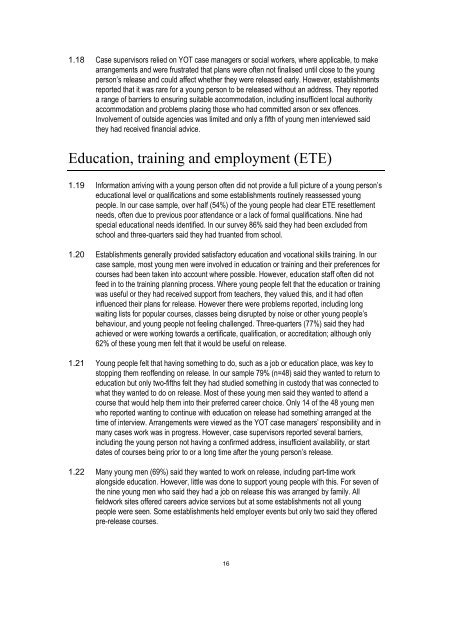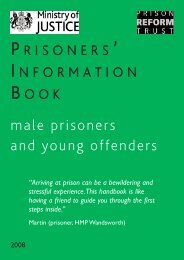Resettlement provision for children and young ... - Ministry of Justice
Resettlement provision for children and young ... - Ministry of Justice
Resettlement provision for children and young ... - Ministry of Justice
You also want an ePaper? Increase the reach of your titles
YUMPU automatically turns print PDFs into web optimized ePapers that Google loves.
1.18 Case supervisors relied on YOT case managers or social workers, where applicable, to make<br />
arrangements <strong>and</strong> were frustrated that plans were <strong>of</strong>ten not finalised until close to the <strong>young</strong><br />
person’s release <strong>and</strong> could affect whether they were released early. However, establishments<br />
reported that it was rare <strong>for</strong> a <strong>young</strong> person to be released without an address. They reported<br />
a range <strong>of</strong> barriers to ensuring suitable accommodation, including insufficient local authority<br />
accommodation <strong>and</strong> problems placing those who had committed arson or sex <strong>of</strong>fences.<br />
Involvement <strong>of</strong> outside agencies was limited <strong>and</strong> only a fifth <strong>of</strong> <strong>young</strong> men interviewed said<br />
they had received financial advice.<br />
Education, training <strong>and</strong> employment (ETE)<br />
1.19 In<strong>for</strong>mation arriving with a <strong>young</strong> person <strong>of</strong>ten did not provide a full picture <strong>of</strong> a <strong>young</strong> person’s<br />
educational level or qualifications <strong>and</strong> some establishments routinely reassessed <strong>young</strong><br />
people. In our case sample, over half (54%) <strong>of</strong> the <strong>young</strong> people had clear ETE resettlement<br />
needs, <strong>of</strong>ten due to previous poor attendance or a lack <strong>of</strong> <strong>for</strong>mal qualifications. Nine had<br />
special educational needs identified. In our survey 86% said they had been excluded from<br />
school <strong>and</strong> three-quarters said they had truanted from school.<br />
1.20 Establishments generally provided satisfactory education <strong>and</strong> vocational skills training. In our<br />
case sample, most <strong>young</strong> men were involved in education or training <strong>and</strong> their preferences <strong>for</strong><br />
courses had been taken into account where possible. However, education staff <strong>of</strong>ten did not<br />
feed in to the training planning process. Where <strong>young</strong> people felt that the education or training<br />
was useful or they had received support from teachers, they valued this, <strong>and</strong> it had <strong>of</strong>ten<br />
influenced their plans <strong>for</strong> release. However there were problems reported, including long<br />
waiting lists <strong>for</strong> popular courses, classes being disrupted by noise or other <strong>young</strong> people’s<br />
behaviour, <strong>and</strong> <strong>young</strong> people not feeling challenged. Three-quarters (77%) said they had<br />
achieved or were working towards a certificate, qualification, or accreditation; although only<br />
62% <strong>of</strong> these <strong>young</strong> men felt that it would be useful on release.<br />
1.21 Young people felt that having something to do, such as a job or education place, was key to<br />
stopping them re<strong>of</strong>fending on release. In our sample 79% (n=48) said they wanted to return to<br />
education but only two-fifths felt they had studied something in custody that was connected to<br />
what they wanted to do on release. Most <strong>of</strong> these <strong>young</strong> men said they wanted to attend a<br />
course that would help them into their preferred career choice. Only 14 <strong>of</strong> the 48 <strong>young</strong> men<br />
who reported wanting to continue with education on release had something arranged at the<br />
time <strong>of</strong> interview. Arrangements were viewed as the YOT case managers’ responsibility <strong>and</strong> in<br />
many cases work was in progress. However, case supervisors reported several barriers,<br />
including the <strong>young</strong> person not having a confirmed address, insufficient availability, or start<br />
dates <strong>of</strong> courses being prior to or a long time after the <strong>young</strong> person’s release.<br />
1.22 Many <strong>young</strong> men (69%) said they wanted to work on release, including part-time work<br />
alongside education. However, little was done to support <strong>young</strong> people with this. For seven <strong>of</strong><br />
the nine <strong>young</strong> men who said they had a job on release this was arranged by family. All<br />
fieldwork sites <strong>of</strong>fered careers advice services but at some establishments not all <strong>young</strong><br />
people were seen. Some establishments held employer events but only two said they <strong>of</strong>fered<br />
pre-release courses.<br />
16

















